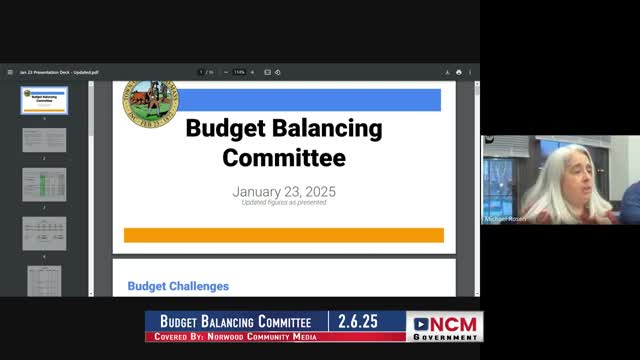Norwood budget panel flags 10.5% health‑insurance projection, $9 million shortfall; sets budget targets for schools and town
Get AI-powered insights, summaries, and transcripts
Subscribe
Summary
At a Feb. 6 meeting of the Budget Balancing Committee in the Town of Norwood, staff reported a likely 10.5% health‑insurance increase that would add about $467,000 to shared costs and push a projected shortfall close to $9 million.
At a Feb. 6 meeting of the Budget Balancing Committee in the Town of Norwood, members were told health insurance costs are likely to increase to about 10.5% for the coming year — up from an 8% assumption — which would add roughly $467,000 to the town’s shared costs and widen a projected shortfall to about $8.8 million to $9 million.
The panel, which reviewed updated shared‑cost estimates from staff, agreed on a framework for next budget steps: allow contractual obligations for general government, fund transportation and contractual obligations for schools, and cap additional school staffing at up to five full‑time equivalents (FTEs) as the committee and school leaders model reductions and priorities.
The numbers under discussion showed the town’s 8% health‑insurance projection equaled about a $1,493,963 increase from the prior year; staff told the committee that each percentage point change is roughly $187,000. Committee members and staff calculated that a move from 8% to about 10.5% — a 2.5 percentage‑point change — would add about $467,000 to shared costs.
"It is a big chunk of budget," Maya, chair of the Budget Balancing Committee, said of the insurance increase. Tony Mizuko, staff member, told the committee the Group Insurance Commission had not released final rates and that the 10.5% figure was the working projection: "The GIC did not release their exact rates to exchange … their projection is now 10.5."
Committee discussion also flagged longer‑term pressure from retirement and pension costs. Staff said actuarial trends — including longer life expectancies and recent salary increases — are driving the town’s funded ratio down and will likely increase future pension costs, producing what one staff member described as a coming "wall" of higher contributions over the next several years.
On revenue and reserves, staff walked the committee through free‑cash and stabilization balances: roughly $2.2 million in free cash plus about $2.9 million in override stabilization (a combined balance reported in the meeting as about $5.1–$5.2 million). Members noted that the earlier projected shortfall of about $8.4 million rose to about $8.8 million with updated shared‑cost estimates and that, with health‑insurance changes, a conservative planning figure of about $9 million was reasonable for budgeting discussions.
School‑budget specifics presented to the committee included a base salary increase of about $2.3 million, transportation increases of roughly $900,000, and an out‑of‑district cost estimate near $70,000. School staffing requests sent earlier were described by staff as about 11.6 FTEs overall; the committee asked school leaders to return with tiered reductions and scenarios that would let the district prioritize resources tied to the new middle school while bringing the overall increase closer to a target range the committee could endorse (committee members referenced a working target near 6.1% as a scenario to model versus the schools’ initial 8.1% request).
Members asked staff to produce a short turnaround of scenarios under the new framework and reconvene; the committee set a follow‑up meeting for Feb. 20 at 5 p.m. to review refined numbers and a model that applies the framework (contractual obligations, transportation, and up to five net new school FTEs) against the town’s shared‑cost pressures.
Votes at a glance - Approval of minutes (Oct. 7, 2024): Motion to approve by Bill; second by Matt. Vote recorded as Teresa: yes; Matt: yes; Allen: abstain; Bill: yes; Chair (Maya): yes. Outcome: approved (4 yes, 0 no, 1 abstain). - Approval of minutes (Jan. 23, 2025): Motion to approve by Alan; second by Bill. Vote recorded (as read at the meeting) was unanimous. Outcome: approved. - Motion to adjourn: moved (not specified on the record); second by Matt. Recorded votes: Paul: yes; Theresa: yes; Alan: yes; Bill: yes; Anne Marie: yes; Chair (Maya): yes. Outcome: approved (unanimous).
The committee did not adopt final budget numbers at the meeting. Instead, members asked staff to return with modeled scenarios under the agreed framework and to reflect any final GIC rate announcements. The panel emphasized limiting one‑time free‑cash use for recurring operational costs and said any larger reliance on reserves this year would increase future fiscal pressure.
The committee scheduled a follow‑up meeting for Feb. 20 at 5 p.m. to review the updated scenarios and shared‑cost refinements.
